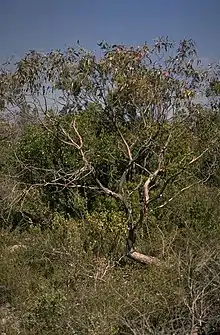Eucalyptus arcana
Eucalyptus arcana, commonly known as the Mallee manna gum or Carpenter Rocks gum[2] is a mallee that is endemic to South Australia. It has rough bark from the base of the trunk to the thinnest branches, lance-shaped, sometimes curved leaves, flower buds in groups of seven, white flowers and hemispherical fruit. It is only known from a single population near Carpenter Rocks.
| Mallee manna gum | |
|---|---|
 | |
| Scientific classification | |
| Kingdom: | Plantae |
| Clade: | Tracheophytes |
| Clade: | Angiosperms |
| Clade: | Eudicots |
| Clade: | Rosids |
| Order: | Myrtales |
| Family: | Myrtaceae |
| Genus: | Eucalyptus |
| Species: | E. arcana |
| Binomial name | |
| Eucalyptus arcana | |
| Synonyms[1] | |
|
Eucalyptus splendens subsp. arcana Nicolle & Brooker | |
Description
Eucalyptus arcana is a low, straggly tree, sometimes with several stems, that typically grows to 6 metres (20 ft) high. It has rough, fibrous, grey to grey-brown bark from the base of the trunk to the larger branches, and smooth, grey to cream bark on the thinnest branches. Young plants and coppice regrowth have four-sided stems and glossy elliptic to egg-shaped leaves 45–120 millimetres (1.8–4.7 in) long and 13–55 mm (0.5–2.2 in) wide with wavy edges. Adult leaves are lance-shaped, the same glossy green on both sides, with a blade that is 80–150 millimetres (3.1–5.9 in) long and 17–30 mm (0.7–1.2 in) wide on a petiole 10–28 mm (0.4–1.1 in) long. The flowers buds are arranged in groups of seven on a peduncle 4–10 mm (0.2–0.4 in) long, the individual flowers on a pedicel up to 2 mm (0.1 in) long. Mature buds are oval to spindle-shaped, 5–7.5 mm (0.20–0.30 in) long and 4–5.5 mm (0.16–0.22 in) wide with an operculum that is shaped like a blunt cone, about equal in length to the floral cup. Flowering occurs in February and the flowers are white. The fruit are hemispherical to cone-shaped, 6–7 mm (0.24–0.28 in) long and 6–8 mm (0.24–0.31 in) wide containing dark brown to black ovoid seeds.[3][4][5][6]
Taxonomy and naming
Mallee manna gum was first formally described in 1998 by Dean Nicolle and Ian Brooker who gave it the name Eucalyptus splendens subsp. arcana and published the description in the Journal of the Adelaide Botanic Gardens.[7][8] In 2009 Kevin Rule raised it to species status as E. arcana.[9][10] The specific epithet (arcana) is a Latin word meaning "secret" or "mysterious", referring to the species being hidden in dense scrub.[8]
Distribution and habitat
Eucalyptus arcana has a limited range and occurs on low rises in shallow, impoverished, red clay-loam soils over limestone around the coastal town of Carpenter Rocks in south-east South Australia. It is found amongst dense tall shrubland, associated with species including Eucalyptus obliqua and Eucalyptus ovata. The populations that Nicolle and Brooker described as E. splendens subsp. arcana occurring near Moonlight Head in south-west Victoria have been assessed as a form of E. aromaphloia.[3][10]
References
- "Eucalyptus arcana". Australian Plant Census. Retrieved 3 March 2019.
- Dean Nicolle. "Native Eucalypts of South Australia". Retrieved 21 October 2016.
- "Eucalyptus arcana (Myrtaceae) Carpenter Rocks Gum". Seed of South Australia. Botanic Gardens of South Australia. Retrieved 3 March 2019.
- "Eucalyptus splendens subsp. arcana". Euclid: Centre for Australian National Biodiversity Research. Retrieved 3 March 2019.
- Nicolle, Dean; Kellerman, Jürgen (ed.). "Flora of South Australia" (PDF). State Herbarium of South Australia. Retrieved 3 March 2019.CS1 maint: extra text: authors list (link)
- Nicolle, Dean (2013). Native Eucalypts of South Australia. Adelaide: Dean Nicolle. pp. 152–153. ISBN 9780646904108.
- "Eucalyptus splendens subsp. arcana". APNI. Retrieved 3 March 2019.
- Nicolle, Dean; Brooker, Ian (1998). "Eucalyptus splendens subsp. arcana (Myrtaceae) an endangered new subspecies endemic to South Australia" (PDF). Journal of the Adelaide Botanic Gardens. 18 (2): 103–106. Retrieved 3 March 2019.
- "Eucalyptus splendens arcana". APNI. Retrieved 3 March 2019.
- Rule, Kevin (2009). "Eucalyptus arcana (Myrtaceae), a new combination for a former subspecies of Eucalyptus splendens and notes on a population of scentbark occurring near Moonlight Head in south-west Victoria" (PDF). Muelleria. 27 (2): 230–232. Retrieved 3 March 2019.